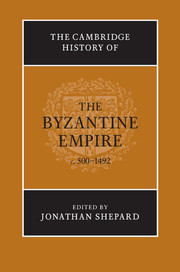Book contents
- Frontmatter
- General Introduction
- Part I The Earlier Empire c. 500–c. 700
- 1 Justinian and His Legacy (500–600)
- 2 Eastern Neighbours
- 3 Western Approaches (500–600)
- 4 Byzantium Transforming (600–700)
- Part II The Middle Empire c. 700–1204
- Part III The Byzantine Lands in the Later Middle Ages 1204–1492
- Glossary (Including some Proper Names)
- Genealogical Tables and Lists of Rulers
- List of alternative place names
- Bibliography
- Picture Acknowledgements
- Index
- References
3 - Western Approaches (500–600)
from Part I - The Earlier Empire c. 500–c. 700
Published online by Cambridge University Press: 28 March 2010
- Frontmatter
- General Introduction
- Part I The Earlier Empire c. 500–c. 700
- 1 Justinian and His Legacy (500–600)
- 2 Eastern Neighbours
- 3 Western Approaches (500–600)
- 4 Byzantium Transforming (600–700)
- Part II The Middle Empire c. 700–1204
- Part III The Byzantine Lands in the Later Middle Ages 1204–1492
- Glossary (Including some Proper Names)
- Genealogical Tables and Lists of Rulers
- List of alternative place names
- Bibliography
- Picture Acknowledgements
- Index
- References
Summary
the continuing unity of the post-roman world
Throughout the political history of western Europe, there have been few periods of such dramatic change as the fifth century. In 400 the borders of the Roman empire in the west, by then distinct from the eastern empire which was governed from Constantinople, stood reasonably firm. They encompassed all of Europe south of the Antonine wall in Britain and the Rhine and Danube rivers on the continent, extending eastwards of the Danube’s confluence with the Drava; they also included a band of territory along the African coast, stretching two-thirds of the way from the Straits of Gibraltar to the Nile. But within a hundred years this mighty entity had ceased to exist. North Africa had come under the power of groups known as Vandals and Alans; Spain of Visigoths and Suevi; and Gaul of Visigoths, Franks and Burgundians. The Romans had withdrawn from Britain early in the century, leaving it exposed to attacks from the Irish, Picts and Anglo-Saxons, while in Italy the last emperor, Romulus Augustulus, was deposed in 476 by a general, Odovacer. The supplanter of Romulus was himself deposed and murdered in 493 by Theoderic the Ostrogoth (493–526), who established a powerful kingdom based on Italy. While the empire had weathered the storms of the fifth century largely unscathed in the east, in the west it had simply ceased to exist. Western Europe, one might be excused for thinking, had moved decisively into a post-Roman period, and the middle ages had begun.
- Type
- Chapter
- Information
- The Cambridge History of the Byzantine Empire c.500–1492 , pp. 196 - 220Publisher: Cambridge University PressPrint publication year: 2009



